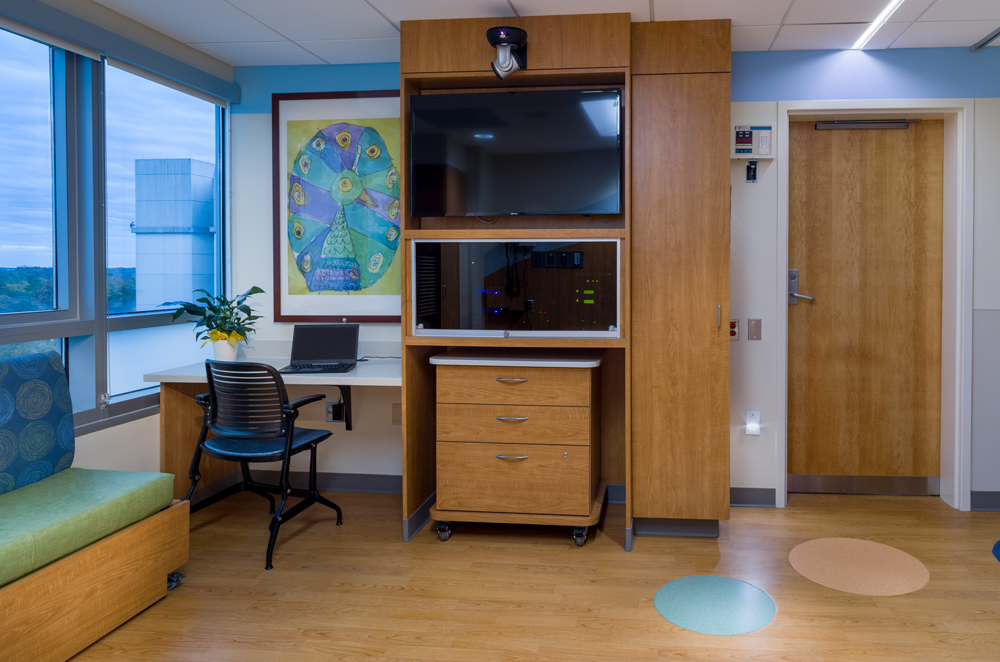Tag Archive for: Atrium Health’s Levine Children’s Hospital
Making A Connection At Atrium Health Levine Children’s Hospital (HealthCare Design Magazine)
/in ISF News & Updates, Press Mentions/by Rachel WoodOriginally published in HealthCare Design Magazine
Young patients undergoing metaiodobenzylguanidine (MIBG) treatment for neuroblastoma, a rare and deadly cancer that affects about 750 children a year, face long periods of isolation as the treatment makes patients’ bodily fluids radioactive, meaning caregivers and parents can spend only five minute per day in their room. Additionally, the treatment requires specialized rooms that need to be lined with 1 inch of lead brick shielding around all four walls and at the floor level.

Because not every facility has the budget or space to accommodate the specialized design, many families are forced to travel away from home to find a treatment facility—a reality faced by the Santos family when their daughter Isabella was diagnosed with the disease at age 2. She endured five relapses with the disease before she passed away at age 7 in 2012. Following her death, the family created the Isabella Santos Foundation and donated $1 million to Atrium Health Levine Children’s Hospital in Charlotte, N.C., to build the city’s first MIGB therapy suite.
Working with Little (Charlotte), the hospital decided to turn two side-by-side patient rooms on the 11th floor pediatric oncology unit into a 244-square-foot MIBG room and a 250-square-foot parent room. A nearby storage room was converted into the Hot Lab, where the treatment is prepared. “Proximity to the Hot Lab reduces travel time to the patient and the risk of radiation exposure to others,” says Roger Wilkerson, healthcare practice leader at Little.
To address the isolation of the treatment as well as the need to provide constant patient monitoring, a lead-line window and door were added between the rooms to visibly and physically connect the two spaces, with all access to the patient room coming through the parent room. “It allows the parent to see the child when they cannot physically be in the room,” Wilkerson says. Additionally, the rooms are connected by an AV system, which allows caregivers to see, talk, and play games with the child.
Charlotte now has a new way to treat rare cancers
/in ISF MIBG, ISF MIBG Ambassador, ISF News & Updates/by Rachel Wood
 Levine Children’s has a new way to treat rare cancers. In December, they opened the Isabella Santos Foundation MIBG Therapy Suite at Levine Children’s Hospital – one of only a handful in the United States.
Levine Children’s has a new way to treat rare cancers. In December, they opened the Isabella Santos Foundation MIBG Therapy Suite at Levine Children’s Hospital – one of only a handful in the United States.
Alexandra (center) is the first patient to receive MIBG treatment in the new The Isabella Santos Foundation MIBG therapy suite at Levine Children’s Hospital. She has neuroblastoma and has relapsed 10 times. Alexandra’s first treatment went well, and she thought it was “so cool” to be the first patient, making history and paving the way for others.
For Children with Cancer, Building a Room With a View to a Better Future
/in ISF MIBG, ISF MIBG Ambassador, ISF News & Updates/by Rachel WoodOriginally published on Atrium Health’s Daily Dose
Opening one of the country’s few lead-lined rooms to treat rare cancers, Levine Children’s Hospital will soon change the landscape for local cancer care. And Charlotte can thank one little girl who inspired a community to build hope for kids like her.
Toward the end of her fight against cancer, 7-year-old Isabella Santos received a special therapy called MIBG that added 10 more months to her life, including another Christmas and another birthday spent with her family.
Back in 2011, Isabella had to leave her hometown of Charlotte for her MIBG treatment, which can only be delivered in a lead-lined hospital room that keeps the therapy’s radioactivity in check. But today, thanks to the foundation created in Isabella’s honor, children from Charlotte with rare types of cancer can stay close to home to get this cutting-edge treatment.
Levine Children’s Hospital, backed by a $1 million grant from the Isabella Santos Foundation (ISF), will soon open its own MIBG therapy suite – and become one of a handful of children’s hospitals in the country to have one.
This room “is really going to change the landscape” of local cancer care, says Javier Oesterheld, MD, medical director of the cancer program at Levine Children’s. An MIBG room can not only treat children with neuroblastoma – the type of cancer Isabella had – but also be used in advanced clinical trials to test new products on different types of cancers.
“We’ll really be ready for the next wave of clinical medicine,” says Dr. Oesterheld, who also treated Isabella.
A room like no other
LCH’s room has been designed to offer the best patient experience possible. The room is actually a suite – with a separate space where a child’s family can stay overnight.
During Isabella’s MIBG treatment at the out-of-state hospital, her mother Erin stayed in the same room with her and was exposed to a large amount of radiation.
“I felt extremely exposed at the time during the treatment,” says Erin, who is the co-founder and president of ISF. “Of course, I was willing to do that for my daughter, but I feel like keeping the parents safe should be as important as keeping the patient safe.”
The room at LCH will be one of the safest in the nation. More than 20,000 pounds of lead will separate the patient’s room from other parts of the suite.
Despite this physical barrier, the room will have several features that keep patients and their families connected. A lead-lined window will allow them to see each other directly. And an advanced audio-visual system will allow nurses and family members to monitor patients at all times – and even have a little fun.
“We’ve been able to let the parent and the patient play video games together from separate rooms. We have a great audio system where they can constantly hear each other,” says Dawn Bartock, CPNP, MIBG therapy clinical lead and pediatric nurse practitioner.
Erin Santos also wanted the room to reflect Isabella. Her artwork graces the walls, and the ceiling features twinkling lights and a shooting star.
“Every time I visit the suite, I can feel Isabella’s presence,” says Erin.
Community support changes everything
Although ISF has supported individual clinical trials and paid for LCH staff in the past, the MIBG room represents the foundation’s most significant contribution to date.
The room has been on Dr. Oesterheld’s “wish list” for a long time, because he knew how much it could improve care for his patients. And he’s certain it couldn’t have happened without ISF’s tireless fundraising in Charlotte.
“I think it’s monumental that our community has come together to make us the top pediatric cancer program we are,” says Dr. Oesterheld.
And more help is on the way. Earlier this year, the ISF pledged $5 million to create the Isabella Santos Foundation Rare and Solid Tumor Program, which will expand the hospital’s pediatric clinical trials and recruit a national expert on pediatric solid tumors as its endowed chair.
But the room is a tangible – and emotional – first step to improve the lives of so many patients.
“To think that Isabella will almost be gone longer than she was alive… what an incredible impact her seven years of life has provided for other families. I’m extremely honored that this is being built. I’m so proud of it,” says Erin.
Shining a Spotlight on Joedance Film Festival
/in ISF News & Updates/by Rachel Wood
Joedance Film Festival is held in memory of Joe
What started as a neighborhood outdoor movie night has evolved into a successful Charlotte film festival to raise funds for pediatric cancer research.
Joedance Film Festival is held the first weekend in August in Charlotte. This year marked the 9th annual festival and a major milestone for growth. Originally held in a townhome courtyard in Uptown Charlotte, Joedance recently expanded to the Charlotte Ballet Center of Dance. Several hundred people gathered for this year’s event, which screened 13 short films by film directors, writers and producers who have a Charlotte connection.
“This was the first year it was at the Charlotte Ballet Center for Dance and it was fabulous,” said Diane, Joe’s mom and founding president of Joedance Film Festival. “Changing venues was good for the festival. It felt like we grew up!”
The two-day film festival is held in memory of Joe who passed away at age 20 from bone cancer in 2010. Funds raised support rare pediatric cancer research and clinical trials at Atrium Health’s Levine Children’s Hospital. Many of the things that Joedance funds came from discussions that Joe’s family had with him before he passed away.
“As a family, we had time to deal with Joe’s cancer,” said Diane, Joe’s mom and founding president of Joedance Film Festival. “He was of an age to understand what was going on and wanted us to continue to raise funds for Levine Children’s Hospital. For him to make a list of what he wanted us to do gave us a clear path.”

The Charlotte Ballet Center of Dance is now home to Joedance Film Festival
In fulfilling Joe’s wishes, the organization established a paid summer internship program at Levine Children’s Hospital for college students in the medical field. It also funds the recurrent bone cancer trial at Jeff Gordon Children’s Hospital and the Isabella Santos Foundation. It has also committed to fund first-line research technicians at Levine Children’s Hospital’s pediatric cancer research lab, which will open in 2019. For the past six years, Joedance coordinates Modern Salon & Spa to do a spa day every other month for the parents at Levine Children’s Hospital. To date, Joedance has donated over $150,000 to Levine Children’s Hospital.
Joedance is also the beneficiary of the Premier Property Solutions Panthers Tailgate Party. The next one will take place on Sunday, November 4 at 1341 S. Mint Street. If you’re in the area, stop by and support Joedance while cheering on our Carolina Panthers.


